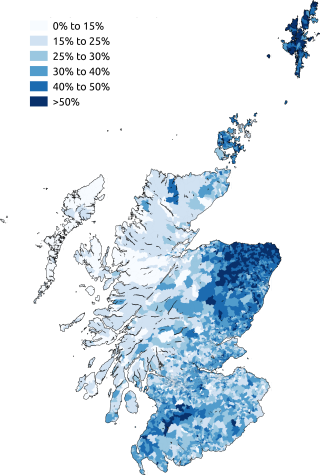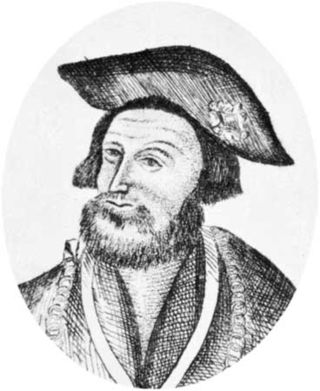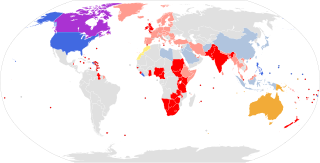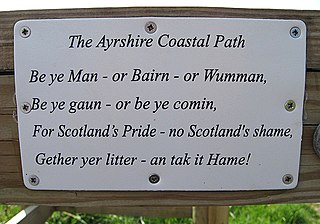Related Research Articles

Hogmanay is the Scots word for the last day of the old year and is synonymous with the celebration of the New Year in the Scottish manner. It is normally followed by further celebration on the morning of New Year's Day and, in some cases, 2 January—a Scottish bank holiday. In a few contexts, the word Hogmanay is used more loosely to describe the entire period consisting of the last few days of the old year and the first few days of the new year. For instance, not all events held under the banner of Edinburgh's Hogmanay take place on 31 December.

The letter yogh (ȝogh) was used in Middle English and Older Scots, representing y and various velar phonemes. It was derived from the Insular form of the letter g, Ᵹᵹ.
Womyn is one of several alternative political spellings of the English word women, used by some feminists. There are other spellings, including womban or womon (singular), and wombyn or wimmin (plural). Some writers who use such alternative spellings, avoiding the suffix "-man" or "-men", see them as an expression of female independence and a repudiation of traditions that define women by reference to a male norm. Recently, the term womxn has been used by intersectional feminists to indicate the same ideas while foregrounding or more explicitly including transgender women, non-binary women, intersex women, queer women, and women of color.

Scots is an Anglic language variety in the West Germanic language family, spoken in Scotland and parts of Ulster in the north of Ireland. Most commonly spoken in the Scottish Lowlands, Northern Isles, and northern Ulster, it is sometimes called Lowland Scots to distinguish it from Scottish Gaelic, the Goidelic Celtic language that was historically restricted to most of the Scottish Highlands, the Hebrides, and Galloway after the sixteenth century; or Broad Scots to distinguish it from Scottish Standard English. Modern Scots is a sister language of Modern English, as the two diverged independently from the same source: Early Middle English (1100–1300).
Scotch is an adjective in English, meaning "of or from Scotland". Many Scots dislike the term Scotch and some consider it offensive. The modern usage in Scotland is Scottish or Scots, and the word Scotch is now only applied to specific products, mostly food or drink, such as Scotch whisky, Scotch pie and Scotch broth.

Thorn or þorn is a letter in the Old English, Old Norse, Old Swedish and modern Icelandic alphabets, as well as modern transliterations of the Gothic alphabet, Middle Scots, and some dialects of Middle English. It was also used in medieval Scandinavia, but it was later replaced with the digraph th, except in Iceland, where it survives. The letter originated from the rune ᚦ in the Elder Futhark and was called thorn in the Anglo-Saxon and thorn or thurs in the Scandinavian rune poems. It is similar in appearance to the archaic Greek letter sho (ϸ), although the two are historically unrelated. The only language in which þ is currently in use is Icelandic.

Stephen or Steven is a common English first name. It is particularly significant to Christians, as it belonged to Saint Stephen, an early disciple and deacon who, according to the Book of Acts, was stoned to death; he is widely regarded as the first martyr of the Christian Church.

A given name is the part of a personal name that identifies a person, potentially with a middle name as well, and differentiates that person from the other members of a group who have a common surname. The term given name refers to a name usually bestowed at or close to the time of birth, usually by the parents of the newborn. A Christian name is the first name which is given at baptism, in Christian custom.

Sir David Lyndsay of the Mount was a Scottish knight, poet, and herald who gained the highest heraldic office of Lyon King of Arms. He remains a well regarded poet whose works reflect the spirit of the Renaissance, specifically as a makar.

Flyting or fliting, is a contest consisting of the exchange of insults between two parties, often conducted in verse.
Craic or crack is a term for news, gossip, fun, entertainment, and enjoyable conversation, particularly prominent in Ireland. It is often used with the definite article – the craic – as in the expression "What's the craic?", meaning "How are you?" or "What's happening?". The Scots and English crack was borrowed into Irish as craic in the mid-20th century and the Irish spelling was then reborrowed into English. Under both spellings, the term has become popular and significant in Ireland.

A makar is a term from Scottish literature for a poet or bard, often thought of as a royal court poet.

Despite the various English dialects spoken from country to country and within different regions of the same country, there are only slight regional variations in English orthography, the two most notable variations being British and American spelling. Many of the differences between American and British/English in the Commonwealth of Nations date back to a time before spelling standards were developed. For instance, some spellings seen as "American" today were once commonly used in Britain, and some spellings seen as "British" were once commonly used in the United States.
A laird is the owner of a large, long-established Scottish estate. In the traditional Scottish order of precedence, a laird ranked below a baron and above a gentleman. This rank was held only by those lairds holding official recognition in a territorial designation by the Lord Lyon King of Arms. They are usually styled [name] [surname] of [lairdship]. However, since "laird" is a courtesy title, it has no formal status in law.

Shetland dialect is a dialect of Insular Scots spoken in Shetland, an archipelago to the north of mainland Scotland. It is derived from the Scots dialects brought to Shetland from the end of the fifteenth century by Lowland Scots, mainly from Fife and Lothian, with a degree of Norse influence from the Norn language, which is an extinct North Germanic language spoken on the islands until the late 18th century.

The languages of Scotland belong predominantly to the Germanic and Celtic language families. The main language now spoken in Scotland is English, while Scots and Scottish Gaelic are minority languages. The dialect of English spoken in Scotland is referred to as Scottish English.
Seelie is a term for fairies in Scottish folklore, appearing in the form of seely wights or The Seelie Court. The Northern and Middle English word seely, and the Scots form seilie, mean "happy", "lucky" or "blessed." Despite their name, the seelie folk of legend could be morally ambivalent and dangerous. Calling them "seelie," similar to names such as "good neighbors," may have been a euphemism to ward off their anger.
Lindsay is both a Scottish surname and a given name. The given name comes from the Scottish surname and clan name, which comes from the toponym Lindsey, which in turn comes from the Old English toponym Lindesege for the city of Lincoln, in which Lind is the original Brittonic form of the name of Lincoln and island refers to Lincoln being an island in the surrounding fenland. Lindum Colonia was the Roman name of the settlement which is now the City of Lincoln in Lincolnshire. Lindum was a Latinized form of a native Brittonic name which has been reconstructed as *Lindon, which means "pool" or "lake" and refers to the Brayford Pool.

Modern Scots comprises the varieties of Scots traditionally spoken in Lowland Scotland and parts of Ulster, from 1700.

Sean, also spelled Seán or Séan in Hiberno-English, is a masculine given name of Irish origin. It comes from the Irish versions of the Biblical Hebrew name Yohanan, Seán and Séan, rendered John in English and Johannes/Johann/Johan in other Germanic languages. The Norman French Jehan is another version.
References
- ↑ "Clan/Family Histories – Lindsay". www.rampantscotland.com. Retrieved 2 December 2012.
- ↑ "Wynd". www.merriam-webster.com. Retrieved 24 December 2012.
- ↑ "Lynd Family Crest and History". www.houseofnames.com. January 2000. Retrieved 24 December 2012.
- ↑ "Lyndsay – meaning of name Lyndsay (girl)". www.thinkbabynames.com. Retrieved 24 December 2012.